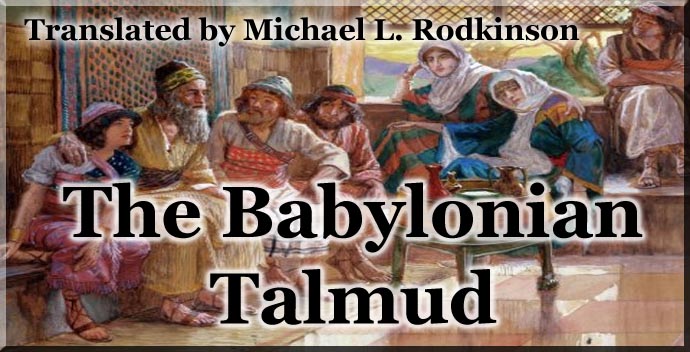Tract Baba
Bathra, Part I
|
| |
Title Page |
| |
Explanatory
Remarks |
| |
Dedication |
| |
Synopsis Of
Subjects |
|
Chapter 1 |
Rules and Regulations Concerning Houses, Yards, and Fields
in Partnership or Conjointly; the Sharing in Partitions, Fences, and Walls;
Looking Into Others' Property; Claims Paid Before Due; Duties of One to His
City--Streets, Etc.; Citizenship by Lapse of Time, and Concerning the Size of a
Yard Liable to Division |
|
Chapter 2 |
Rules and Regulations Concerning Space to be Left Between
One's Property and Another's, be it of One or Two Kinds. Under What Conditions a
Tenant May Place an Oven in His Dwelling. Under What Circumstances a Shop in a
Yard May be Prevented. Concerning the Space to be Left between a City and
Pigeon-Coops, Trees, Barns, Cemeteries, and Tanneries |
|
Chapter 3 |
Rules and Regulations Concerning Occupancy (Hazakah)--At
What Time and In What Respect It Gives Title. Replevins by Court. Properties
Occupied By a Defendant Who Is Mightier Than the Plaintiff but Equal in
Evidence. a Protest against Occupancy in One's Presence or Absence by One's
Opponent. The Writing of Bills Of Sale and Deeds of Gift. Occupancies Which Came
From Inheritance. The Occupancies of Specialists, Partners, Gardeners, and
Guardians. Obtaining Properties from the Contracting Collectors of Duties and
Taxes. Bailments--Of Whom They May be Accepted. Personal Properties to Which The
Law Of Occupancy Does and Does Not Apply. Opening Of Windows and Doors to
Neighbors' or Partners' Properties, and Building Of Caves, Pits, Etc., Under
Public Ground |
|
Chapter 4 |
Rules and Regulations Concerning Unconditional and
Conditional Sales Or Gifts Of Buildings, Houses, and Palaces: What Is and What
Is Not Included; and Also Concerning Yards, Bath-Houses, and Press-Houses for
Oil and Wine. Sales of Whole Cities, Valleys, Fields, Wells, Etc. |
|
Chapter 5 |
Rules and Regulations Concerning Sales Of Ships, Boats,
Animals, and Teams; Concerning Broods Of Pigeons and Beasts; Trees, With The
Ground and Without. How to Acquire Title to Fruit and Flax. Of Articles Which
Became Dearer or Cheaper Between the Time of Sale and Delivery. At What Time the
Wholesalers and Storekeepers Had to Correct Their Weights and Measures, and Of
What Material the Weights Might and Might Not be Made |
| |
Appendix to Mishna I., Chap. III, Page 83
|
| |
|
Tract Baba
Bathra, Part II
|
| |
Title Page |
| |
Explanatory
Remarks |
| |
Dedication |
| |
Synopsis Of
Subjects |
|
Chapter 6 |
Rules and Regulations Concerning the Sale of Seeds Which
Become Spoiled, the Quantity of Dust Which May or May Not be Accepted in the
Measures of Grain and Fruit, and Wine Which Becomes Sour After Sale Before
Delivery.--Concerning Contractors for Houses and Stables, Wells and Gardens,
Situated in Neighbors' Properties or Public Thoroughfares in Private Ground, and
Concerning Graves and Caves for Burying |
|
Chapter 7 |
Rules and Regulations Concerning Rocks and Pits in Ground
Sold; the Quantities of Greater or Less Measure Which May or May Not Void a Sale
of Fields, Villages, Etc. |
|
Chapter 8 |
Rules and Regulations Concerning Bequests to and
inheritance By Near and Distant Relatives, Male and Female Slaves and their
Descendants, First Born and Husbands. One May or May Not Wish to Bequeath His
Estate to Strangers When He Has Children. Which Wills Must be Considered and
Which Wills Must Not. The Dividing of an inheritance between Grown-Up and Minor
Children, Male and Female |
|
Chapter 9 |
Rules and Regulations Concerning the Support of Unmarried
Daughters after the Death of their Father, If Among the Children Were an
Hermaphrodite or An Androgyn. May or May Not One Bequeath His Estate to
Strangers If He Has Children? Does the Second Will Abolish the First? If a Sick
Person Recovers After Making a Gift While Sick, May He Retract or Not? If Sudden
Death Occur to Many Persons, and It Is Not Known Who Died First, and Each of the
Heirs Claims for His Benefit |
|
Chapter 10 |
How Deeds Should be Written and Where the Witnesses Should
Sign. Concerning Erasures of Some Words in Deeds. In Which Cases both Parties
Must be Present At the Writing of the Deeds, and in Which One of them Suffices.
Concerning a Deposited Deed Which Was Paid in Part. How Shall the Court Approve
An Erased Document? Property for Private Use Which Was Left to Poor and Rich
Brothers |
| |
|
|
|



 Home
Home What's New
What's New Bible
Bible Photos
Photos Hiking
Hiking E-Books
E-Books Genealogy
Genealogy Profile
Free Plug-ins You May Need
Profile
Free Plug-ins You May Need
 Get Java
Get Java.png) Get Flash
Get Flash Get 7-Zip
Get 7-Zip Get Acrobat Reader
Get Acrobat Reader Get TheWORD
Get TheWORD